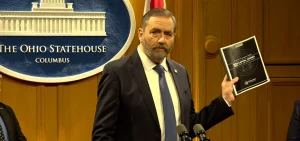News
An attorney general report says Ohio’s death penalty is “unworkable” as he backs a bill to change it
By: Karen Kasler | Statehouse News Bureau
Posted on:
COLUMBUS, Ohio (Statehouse News Bureau) — Ohio’s Republican attorney general says the state’s death penalty is “unworkable” as is, in his office’s latest report on capital crimes and punishment in Ohio.

Attorney General Dave Yost’s 2023 Capital Crimes Report estimates it would take $121 million to $363 million in legal costs to execute all 119 condemned people on Ohio’s death row who are facing a combined 121 death sentences. Yost’s report describes that as “a stunning amount of money to spend on a program that doesn’t achieve its purpose.”
“At present, an inmate on Ohio’s Death Row spends an average of 21.37 years on Death Row — mostly as a result of multiple avenues for appeal — before an execution is carried out,” the report said. “And currently, because of the state’s inability to secure execution drugs, no Death Row inmate faces imminent execution. This means that an inmate is more likely to die of suicide or natural causes than execution.”
The 424-page report covers the death penalty in Ohio from when the law was enacted in 1981 till Dec. 31, 2023, during which 336 people have received 341 death sentences. But it notes 56 executions have been carried out, which is one in six.
“If we were starting from scratch to design a system for the ultimate punishment — whether that punishment is execution or, instead, life in prison without parole — neither death-penalty opponents nor death-penalty supporters would create anything like Ohio’s current system, which produces churn, waste, and endless lawsuits but nothing else,” the report concluded.
Yost supports a bill to add nitrogen to lethal injection as an approved execution method. Gov. Mike DeWine has said the state hasn’t been able to acquire lethal injection drugs since the last execution in 2018, just before he took office. The bill’s Republican sponsors call it a needed solution to the drug impasse.
Meanwhile, there are bills in the House and Senate to abolish the death penalty in Ohio. While similar measures have been proposed for more than a decade, this time there’s support from conservative Republicans including Reps. Jean Schmidt (R-Loveland) and Josh Williams (R-Sylvania).

